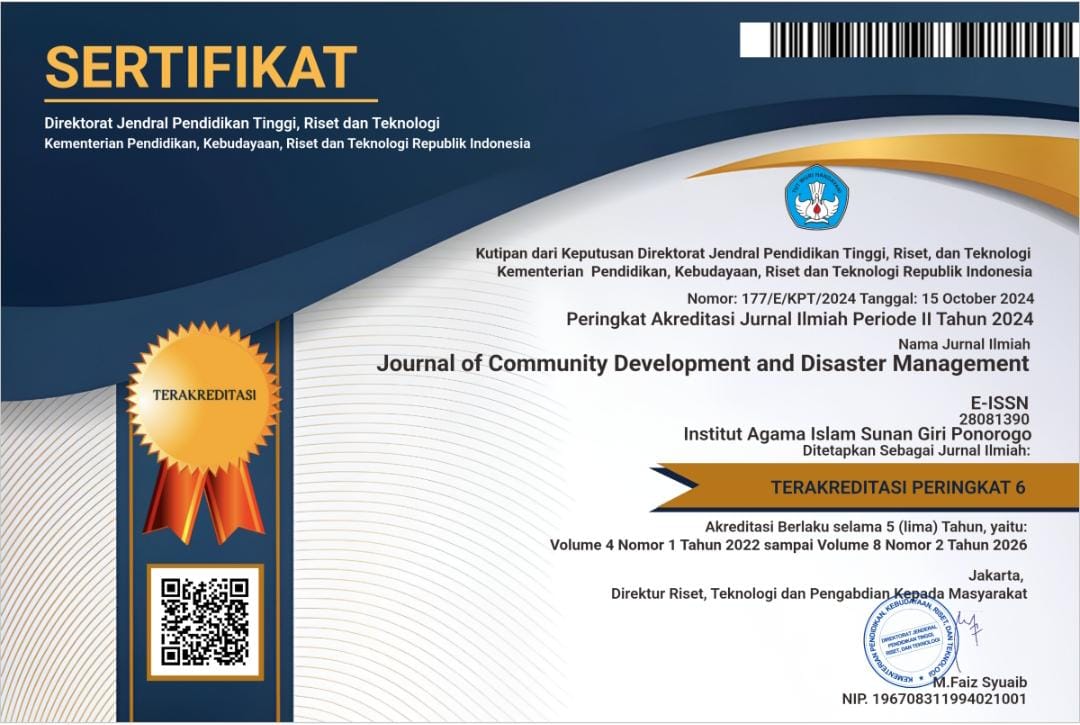Integration of Islamic Religious Education (PAI) with Pancasila in the Formation of Multicultural Character of Students in the Digital Era at SMP Muhammadiyah 03 Pacitan
DOI:
https://doi.org/10.37680/jcd.v7i1.6905Keywords:
Integration of Islamic Religious Education and Pancasila, Multicultural Character Development, PancasilaAbstract
The integration of Islamic Religious Education (PAI) with Pancasila in shaping students' multicultural character in the digital era is a relevant topic in the context of multicultural globalization in Indonesia. Indonesian society faces various cultural, ethnic, and religious differences that require wise management to prevent social disintegration and to harness the innovative potential of multiculturalism. Education plays a crucial role in promoting peace, strengthening intercultural understanding, and creating an inclusive and harmonious society. This study aims to explore the planning of lessons integrating Islamic Religious Education with Pancasila in shaping a multicultural character at SMP Muhammadiyah 03 Pacitan. The research was conducted using a descriptive qualitative approach, focusing on the discussion of holistic and contextual character education in the school. The findings indicate that the integration of Islamic religious education with the values of Pancasila can serve as a strong foundation for building a peaceful and prosperous multicultural character. SMP Muhammadiyah 03 Pacitan has successfully implemented these integrative values within their curriculum, emphasizing respect for diversity and involving the roles of teachers and parents in the learning process. With the integration of Islamic religious education and Pancasila, the school has created an educational environment that promotes harmony and diversity in the ever-evolving digital era. This study contributes significantly to understanding how education can play a vital role in shaping tolerant and inclusive multicultural character amid globalization and digital technological advancements.
References
Adam, I., Walker, T. R., Bezerra, J. C., & Clayton, A. (2020). Policies to reduce single-use plastic marine pollution in West Africa. Marine Policy, 116, 103928.
Agdal, R., Midtgård, I. H., & Meidell, V. (2019). Can asset-based community development with children and youth enhance the level of participation in health promotion projects? A qualitative meta-synthesis. International Journal of Environmental Research and Public Health, 16(19), 3778.
Fanjoy, M., & Bragg, B. (2019). Embracing complexity: Co-creation with retired immigrant women. Gateways: International Journal of Community Research and Engagement, 12(1), ID-6342.
Fitriawan, F., Rohmatulloh, D. M., Asfahani, A., & Ulfa, R. A. (2020). Youth Economic Empowerment Through Oyster Mushroom Cultivation in Sidowayah Hamlet, Jambon District, Ponorogo Regency. Amalee: Indonesian Journal of Community Research and Engagement, 1(1), 47–58.
García, I. (2020). Asset-based community development (ABCD): Core principles. In Research handbook on community development. Edward Elgar Publishing.
Genon, J., Mabunay, J., Opsima, J., Zamora, R., Repaso, J., & Sasan, J. M. V. (2022). Solutions and Strategies to Reduce Damaging Impact of Single-Use Plastic Bag in Toledo City. Amalee: Indonesian Journal of Community Research and Engagement, 3(1), 59–70.
Gislason, M. K., Kennedy, A. M., & Witham, S. M. (2021). The interplay between social and ecological determinants of mental health for children and youth in the climate crisis. International Journal of Environmental Research and Public Health, 18(9), 4573.
Hanifah, U., Alawiyah, P., & Agustin, A. (2020). Community Economic Development Through the Diversification Program of Corn-Based Processed Food in Mategal Village, Parang District, Magetan Regency. Engagement: Journal of Community Service, 4(2), 363–375.
Hasanudin, C., Fitrinaingsih, A., Rosyida, F., & Noeruddin, A. (2021). Training on Writing Articles for Accredited National Journals and Sending Through the Open Journal System (OJS). Indonesian Journal Of Community Service, 1(3), 549–555.
Marchlewska, M., Cichocka, A., Łozowski, F., Górska, P., & Winiewski, M. (2019). In search of an imaginary enemy: Catholic collective narcissism and the endorsement of gender conspiracy beliefs. The Journal of Social Psychology, 159(6), 766--779.
Nawawi, M., Ali, A., Irawan, B., Ahmad, B., Mukramin, S., Marsuki, N. R., … Kaya, I. R. G. (2020). The village kalesang program as a poverty alleviation community. International Journal of Scientific and Technology Research, 9(3), 3103–3107.
Nugroho, L., & Hidayah, N. (2020). E-commerce to improve homemaker productivity (women entrepreneur empowerment at Meruya Utara, Kembangan district, West Jakarta, Indonesia). Amalee: Indonesian Journal of Community Research and Engagement, 1(01), 13–24.
Otto, E., & Dunens, E. (2021). Imparting the Skills Employers Seek: Community-Engaged Learning as Career Preparation. Journal of Community Engagement and Higher Education, 13(1), 39–56.
Rizki, S. N., & Wahdah, N. (2022). Training of the Art Reading Al Qur’an of Sidomulyo Community at Tumbang Tahai Village. International Journal of Community Engagement Payungi, 2(1), 43–50.
Solina, E., Rahmawati, N., & Igiasi, T. S. (2022). Children’s Rights In Public Spaces: Study Of Laman Boenda Park In Tanjungpinang City. Amalee: Indonesian Journal of Community Research and Engagement, 3(2), 467–477.
Village, U. W., Walker, S. E., Bruyere, B. L., Grady, M., McHenry, A., Frickman, C., & Davis, W. (2020). Taking stories: The ethics of cross-cultural community conservation research in Samburu, Kenya. Gateways: International Journal of Community Research and Engagement, 13(1), 1–18.
Wibowo, B. A., & Darsono, D. (2022). Community-Based Tourism Design to Develop a Historical Tourism Village in Yogyakarta. Amalee: Indonesian Journal of Community Research and Engagement, 3(1), 123–138.
Downloads
Published
How to Cite
Issue
Section
License
JCD: Journal of Community Development and Disaster Management rekomendasi pencipta untuk memegang hak cipta tanpa batasan dan batasan pencipta untuk memiliki hak publikasi tanpa batasan, juga pemilik hak komersial atas artikel tersebut adalah pencipta.










